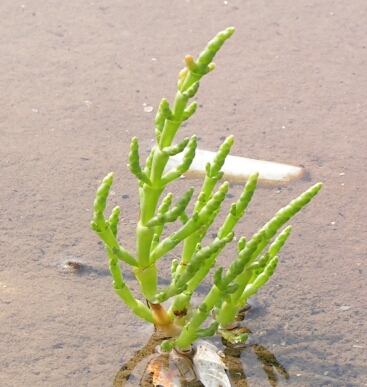Boeing étudie la possibilité d'obtenir des carburants verts à partir de plantes terrestres vivant dans l'eau de mer (marais, mangroves).
http://www.upi.com/Science_News/Resource-Wars/2009/10/06/Seawater-plants-yield-green-aviation-fuel-in-new-research/UPI-84051254864364/Seawater plants yield green aviation fuel in new research
WASHINGTON, Oct. 6 (UPI) -- Boeing and international academic and business partners are looking into ways of producing commercially viable aviation fuel from saltwater plants in a push toward reducing carbon emissions from travel.
The Boeing Co. said scientific studies were focused on salicornia bigelovii and saltwater mangroves -- plants known as halophytes.
Research conducted in the United States, Abu Dhabi, the United Arab Emirates and other locations showed the plants thrive when irrigated with seawater and can be produced in large quantities to extract biofuel suitable for aircraft.
Aviation industry analysts said a biofuel substitute for hydrocarbons used in air travel could help ease environmentalist concerns over aviation's carbon footprint.
A switch from expensive, high-octane aviation fuel to biofuels could also help counter a rising global aversion to air travel because of the perceived damage to the Earth's ecology, said the analysts.
Boeing said it is joining with UOP LLC, a Honeywell company based in Des Plaines, Ill., to commission a study on the sustainability of a leading family of saltwater-based plant candidates for renewable jet fuel.
The study is being commissioned as part of the Sustainable Aviation Fuel Users Group consortium, which brings together UOP and airlines.
Boeing said the Masdar Institute of Science and Technology in Abu Dhabi will lead the study, which will examine the overall potential for sustainable, large-scale production of biofuels made from the halophytes. The institute was established with the cooperation of the Massachusetts Institute of Technology.
Yale University's School of Forestry and Environmental Studies and UOP will participate in the analysis, which will include an assessment of the total carbon lifecycle of biofuels.
Scientists say halophytes can be highly productive sources of biomass energy, thrive in arid land and can be irrigated with seawater, making them suitable for biofuel development.
Abu Dhabi, like parts of the United States and Central and South America, is seen by experts as a viable location for conducting a lifecycle-analysis study.
With improved plant science and agronomy, early testing results indicate that halophytes have the potential to deliver very high yields per unit of land, Boeing said.
Previous biofuel research has focused on algae and vegetation but has met with skepticism, both because of large quantities of fresh water involved in some of the fuel production and because of doubts about how long the alternatives can last as viable substitutes for oil.
Billy Glover, managing director of environmental strategy for Boeing Commercial Airplanes, said the study will enable researchers to "better know if certain types of halophytes meet the carbon reduction and socioeconomic criteria that will allow them to become part of a portfolio of sustainable biofuel solutions for aviation."
Abu Dhabi, a major oil producer within the Organization of Petroleum Exporting Countries, has been investing in research that can prepare the country for a future when oil -- and oil revenues -- are no longer plentiful.
Dr. Sgouris Sgouridis of the Masdar Institute said the initiative aims to create and sustain the world's first carbon-neutral, zero-waste city, Masdar City, to be located on the outskirts of Abu Dhabi.
Boeing says biofuel development is focused on plant sources that do not distort the global food chain, compete with freshwater resources or lead to unintended land use change.
Biofuel research has also picked up in the Caribbean -- though on a modest level and for a different reason. Most Caribbean countries have been hit hard by the recession and are finding it difficult to buy oil, even when offered on easy terms by neighboring exporters such as Venezuela. With international help, Caribbean states have been pushing initiatives to produce biofuels to keep their economies going.
Amicalement





 M. Buschmann CC by-sa
M. Buschmann CC by-sa





